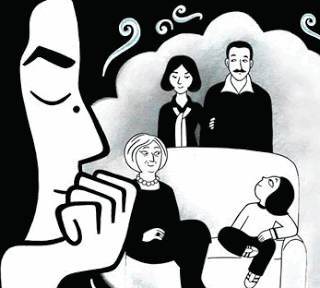Week 8: Stereotype and The Ethics of Representation
This week I read the graphic novel, American Born Chinese, by Gene Luen Yang. It follows three storylines that connect at the end. Each storylines focuses on a similar theme of being judged. It explores how each character has to deal with the typical Chinese stereotypes and how they are insulted and judged because of it. The use of stereotypes can be necessary because they may be needed to prove a particular point/idea. Stereotypes doesn't have to be offensive, instead it can be used to just inform people of a particular group and how they are being represented. In this case, the use of stereotypes show how it affects people both mentally and physically when they have to deal with it. It tries to show the other side of it and hopefully influences people to change the way they think and approach this situation.
While reading this graphic novel, I could really relate to it on a personal level. In America, there are many stereotypes for each asian culture, such as Chinese and Indian. Because of these stupid stereotypes, I remember hating my culture and tried to pretend I wasn't Indian. For instance, I have been asked if I speak Indian or Hindu. First of all, it’s Hindi not Hindu. Believe me, nobody’s fluent in the religion. But also, because I speak a different language people assume I have an accent. Just because I know multiple languages, doesn't mean I have an accent or know how to do a stereotypical Indian accent. This one stereotype leads people to constantly ask me, "Where are you from?" My response is that I am from New Jersey, since I was born and raised there, so people then they ask "but where are you really from, or where is your mom from?" I usually respond with my mom is from Virginia since that is where she was raised. I know that they mean to ask what is my ethnicity but I like to, in a way, mess with them since they are not able to ask the question properly and just assume I am not from here because I look different. I remember being asked these questions during international week at school and the person was embarrassed that they assumed I was an international student so they tried to make up for it by saying "oh you're too exotic to be from New Jersey."
Now there are many more comments I have gotten because of these stereotypes, such as Indians will automatically be vegetarians because they worship the cow, all the marriages are arranged by the Indian parents, we smell like curry or only eat curry, that all asians are good at math, and so on. I do still get irritated with these comments or that it doesn't help that media uses these stereotypes when creating characters. Also, it annoys me that things I used to be made fun of back then such as henna on my hands, is now a popular thing and the meaning behind it has changed. I could keep going on all the things I have experienced and what irritates me about these stereotypes but it would never end. The stereotypical representation of Indians affected my own perception of my culture and made me ashamed of it growing up but now I try to ignore it and embrace who I am.
Now there are many more comments I have gotten because of these stereotypes, such as Indians will automatically be vegetarians because they worship the cow, all the marriages are arranged by the Indian parents, we smell like curry or only eat curry, that all asians are good at math, and so on. I do still get irritated with these comments or that it doesn't help that media uses these stereotypes when creating characters. Also, it annoys me that things I used to be made fun of back then such as henna on my hands, is now a popular thing and the meaning behind it has changed. I could keep going on all the things I have experienced and what irritates me about these stereotypes but it would never end. The stereotypical representation of Indians affected my own perception of my culture and made me ashamed of it growing up but now I try to ignore it and embrace who I am.

Comments
Post a Comment